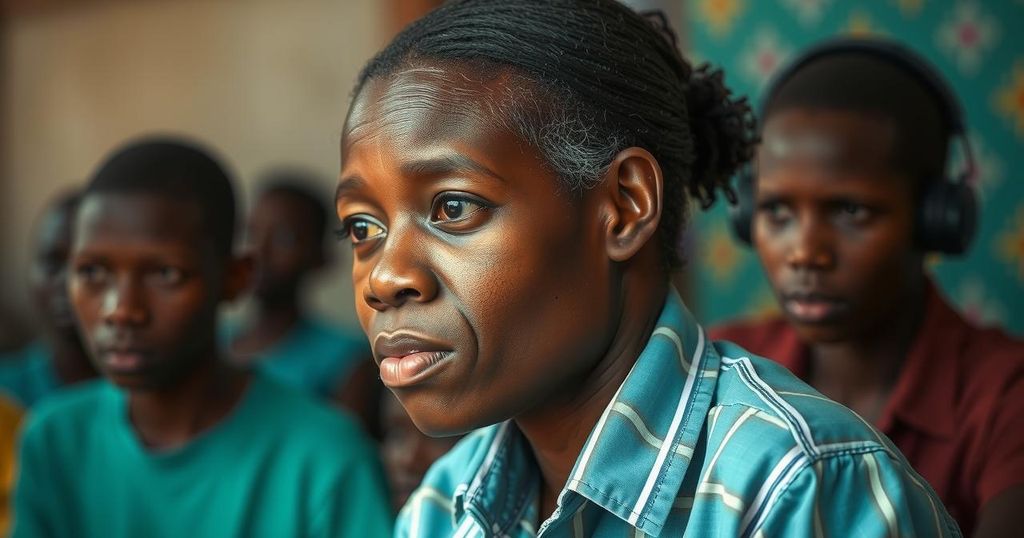Global news
988LIFELINE, ACTION AGAINST, ACTION AGAINST HUNGER, AFRICA, AP, ASSOCIATED PRESS, CIVIL WAR, CONGO, CONGO (KINSHASA), DISPLACEMENT, GOMA, HUMANITARIAN, HUMANITARIAN CRISIS, INNOCENT NTAMUHEZA, INTERNALLY DISPLACED PERSONS (IDPS, NELLY SHUKURU, NTAMUHEZA, ORG, RWANDA, SEXUAL VIOLENCE
Leila Ramsay
0 Comments
Escalating Mental Health Crisis in Eastern Congo Amid Ongoing Conflict
The ongoing conflict in eastern Congo has resulted in a severe mental health crisis characterized by increased rates of anxiety, depression, and suicidal thoughts among displaced populations. Despite a surge in individuals seeking psychosocial support, less than 30% of requested funding for mental health services has been met. The presence of armed groups in displacement camps further intensifies the trauma experienced by survivors, particularly women and children. Immediate action and funding are urgently needed to address the mental health needs of the affected populations.
The ongoing conflict in eastern Congo has resulted in a severe mental health crisis for the local population, with many individuals facing dire circumstances due to displacement and violence. Nelly Shukuru, a mother of six, reflected on her despair, asserting that her suffering felt interminable. Aid organizations report a concerning surge in individuals seeking mental health support, with requests for help swelling by over 200% in six months. Psychologists attribute rising levels of anxiety, depression, and suicidal ideation to the lasting effects of the violence, exacerbated by inadequate support and resources available for mental health care.
The conflict has displaced millions, particularly in regions surrounding Goma, with more than 600,000 individuals residing in precarious camps. Recent reports indicate that the number of people expressing suicidal thoughts has dramatically increased, underscoring the urgent need for mental health services. Despite this growing demand, the United Nations noted that less than 30% of funding requests for mental health programs were met this year, illustrating the critical gap in support provided to the vulnerable populations affected.
The situation is further complicated by the presence of armed groups within displacement camps, creating an environment of fear and insecurity. Survivors of sexual violence face additional trauma due to the persistent presence of armed men. Local organizations like Doctors Without Borders have been overwhelmed by the number of sexual violence cases treated, revealing a disturbing trend that continues to escalate. Moreover, the vulnerability of children exacerbated by separation from their families during conflicts heightens the urgency for specialized support programs.
Some initiatives aim to train community leaders to identify individuals in need of mental health care, yet stigma surrounding mental illness remains a significant barrier to treatment. Counseling methods being implemented provide vital coping strategies for affected individuals, enhancing their ability to manage their psychological distress. Programs such as those run by War Child employ creative therapies to foster emotional expression among children, yet the overarching need for comprehensive mental health support remains urgent. As conditions deteriorate, a concerted effort is required to address this overlooked mental health crisis in eastern Congo, ensuring adequate resources and services are available to those in desperate need.
Eastern Congo has been embroiled in conflict for years, leading to a humanitarian crisis characterized by widespread displacement and violence. The ongoing hostilities, particularly involving the M23 rebel group, have exacerbated challenges for millions, driving them into overcrowded and insecure displacement camps. The mental health crisis has intensified as individuals cope with trauma, loss, and instability. Many suffer from disorders such as PTSD, anxiety, and depression, rendering them in urgent need of psychosocial support. Despite the increasing demand, international aid for mental health services has not kept pace, leaving many in precarious situations without assistance.
In summary, the mental health crisis in eastern Congo, exacerbated by years of conflict and displacement, necessitates immediate and substantial intervention. The alarming rates of anxiety, depression, and suicidal ideation among the affected populations highlight the urgent need for comprehensive mental health care and support systems. As humanitarian aid remains critically underfunded, it is imperative for global actors to prioritize mental health initiatives and ensure that resources are directed toward alleviating the profound psychological suffering endured by the Congolese people. Without sustained support, the cycle of trauma will likely continue unabated, causing long-term ramifications for individual and community recovery efforts.
Original Source: www.ap.org




Post Comment